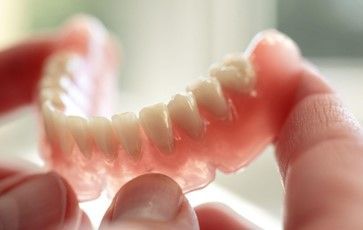Loose-Fitting Dentures? Learn the Basics of Relines
When you are missing teeth, your upper and lower jaws undergo residual ridge resorption (RRR). Without tooth roots to stimulate growth and repair in the jawbone, the body breaks down bony structures and uses those cellular components elsewhere.
As you can imagine, as the jaw ridges in your mouth shrink over time due to RRR, your dentures will become looser. Instead of getting a completely new dental appliance every time this happens, dental offices offer relines on your existing dentures. Here's what you need to know about the process.
When Should a Denture Be Relined?
Every year or every two years is recommended for a reline, but every patient is different. You likely need a reline if:
- Your denture rocks side to side when chewing
- Your denture feels like it's going to fall out
- Your gums are getting sore
- You often find food debris under the appliance
How Are Dentures Relined?
If your dentist believes you need a reline , make an appointment. Instead of using a plastic or metal tray to take an impression of your mouth, your dentist will actually use your current denture as the tray. He or she will then place an elastic paste in the denture and place it in your mouth.
This impression material will flow throughout the denture so that the new impression captures the changes to your jaw ridges. Once the impression has set, the dental assistant or doctor will disinfect the denture impression and send it to a dental laboratory.
Keep in mind that you will be without your denture for a while as dental lab technicians create the reline from the impression. You and your dentist should schedule an appointment at a time where you can comfortably go without the appliance.
At the dental laboratory, technicians will pour a mix of water and gypsum stone into the denture impression to create a 3D mold. Once this mold has hardened, the denture can be cleaned of impression material and adjusted to fit the new mold. The technicians will add resins to the existing denture to correct the fit and border extensions.
Do You Need a Soft or Hard Reline?
If you aren't sure whether you need a soft reline or a hard one, consult with your dentist. Both kinds have pros and cons. Hard relines are made of a tough acrylic and last longer, which means that you won't have to undergo this procedure as often if you take good care of your dentures.
However, some patients find that hard relines aren't as comfortable, so they opt for a flexible resin. Soft relines are also better at distributing pressure when you chew since the material has more give.
If you are used to your dentures, a hard reline will likely be a good fit. However, patients who've just lost teeth may prefer a soft reline since the gum tissue on their ridges may still be sensitive. Also, if you don't want to wait for a denture reline from a dental lab, your dentist may offer a chair-side reline. But chair-side relines may not be as durable as ones made in a lab.
What About Reline Aftercare?
After a reline appointment, make sure you follow any aftercare instructions. For instance, you shouldn't wear your dentures to bed, as this can dry out and crack the resin. Also, it's bad for the bony ridges to be compressed by dentures all night. Denture compression can increase the rate of resorption.
Do not use any cleaner except denture-specific cleaner and denture brushes to clean the appliance. Lastly, do not wash or keep your relines in hot water, as this can warp the denture material.
Contact Advanced Dental Care if you have any questions or concerns about relines or if you need to make an appointment.









